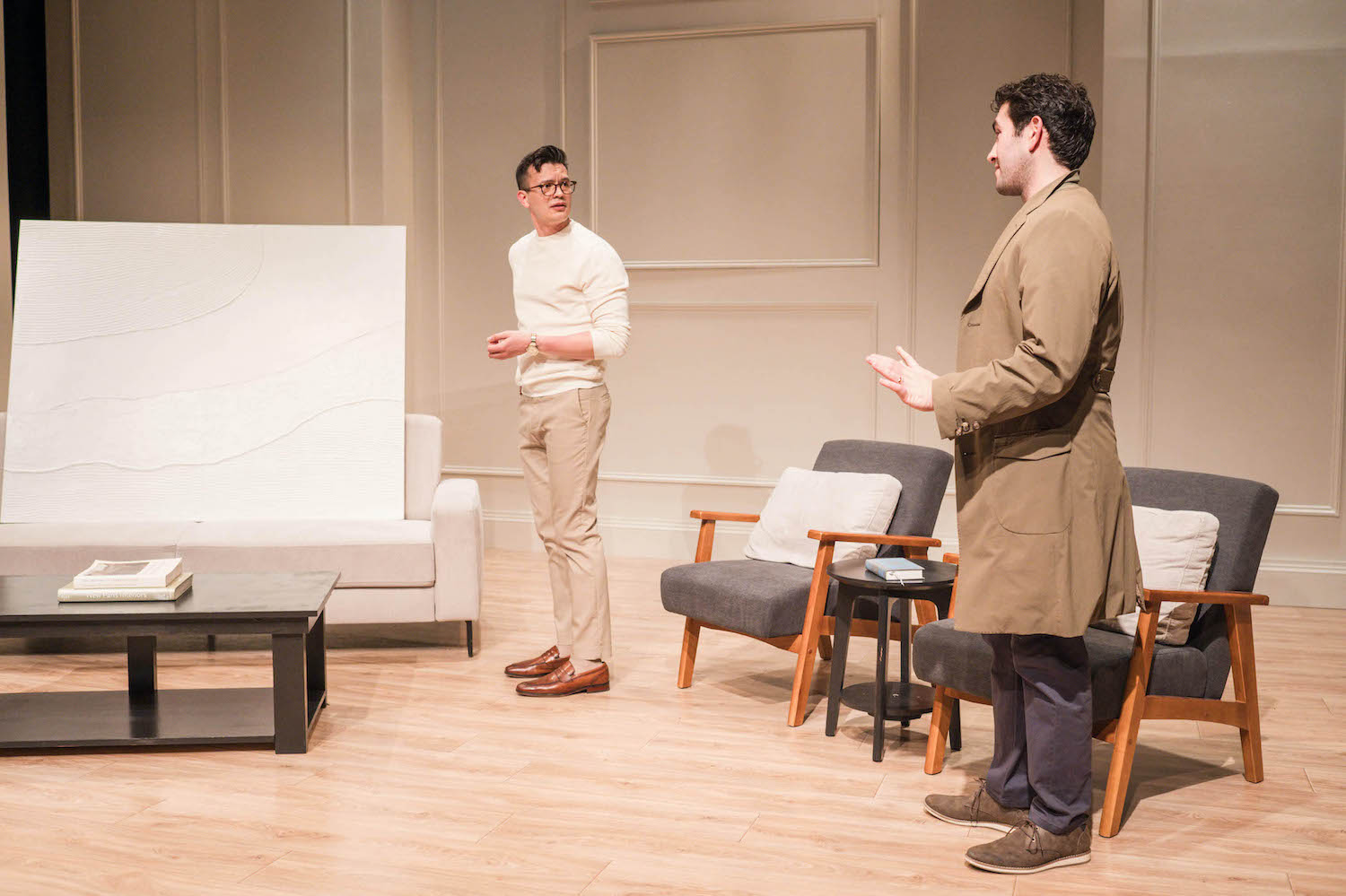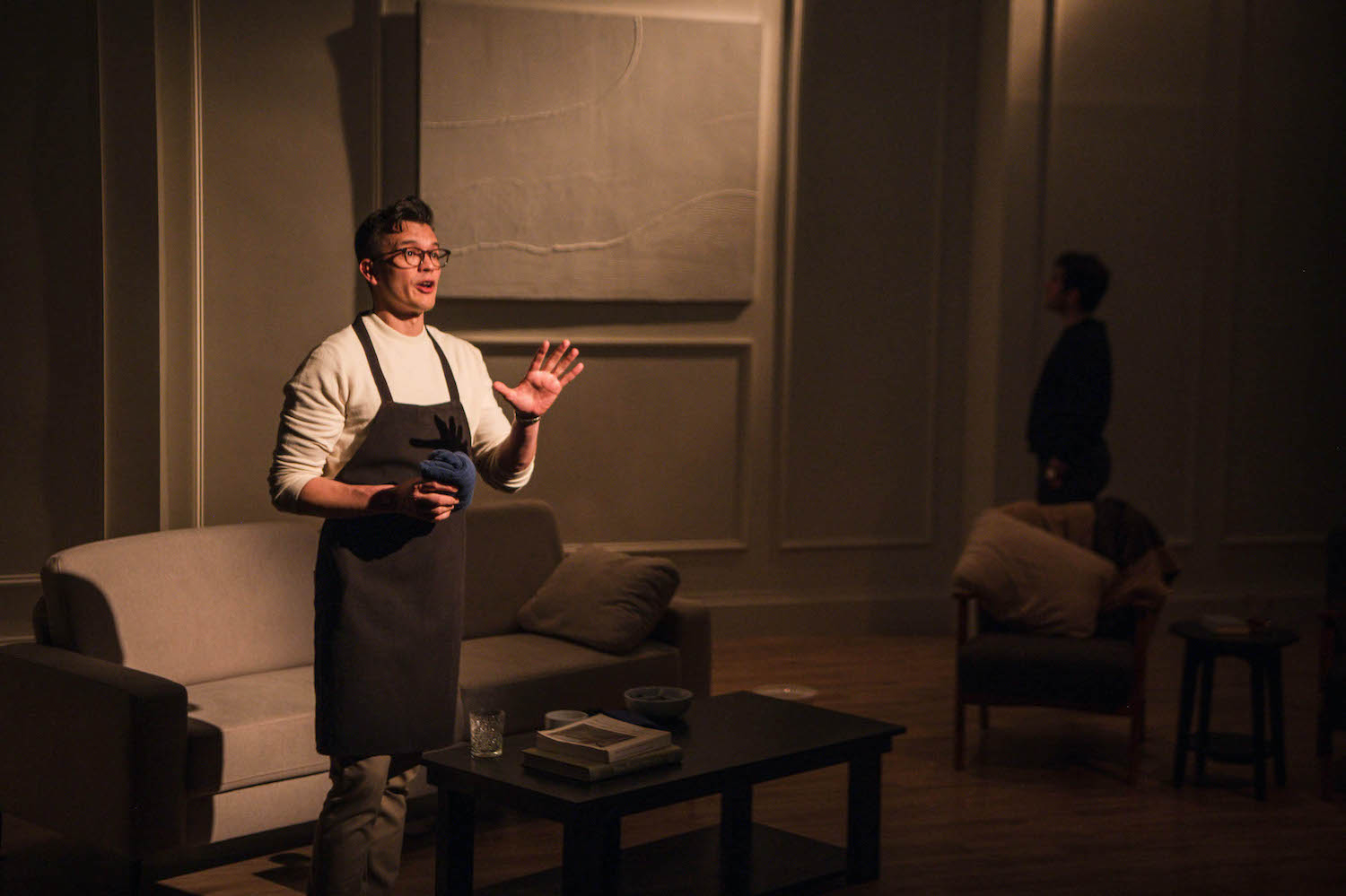
 Remy Bumppo’s “Art,” with Chad Bay and Justin Albinder/Photo: Nomee Photography
Remy Bumppo’s “Art,” with Chad Bay and Justin Albinder/Photo: Nomee Photography
![]()
![]()
![]()
![]() The white-on-white painting at the center of “Art,” Yasmina Reza’s 1994 three-hander now being revived by Remy Bumppo Theatre, lacks obvious pictorial content, setting off a bitter and even violent row among a trio of once-close, now-divided friends. This tempest in a paint pot constitutes the play’s action. But like the blankly enigmatic canvas, Reza’s work, under the direction of Remy Bumppo artistic director Marti Lyons, itself seems a bit short in the content department, leaving the audience sporadically amused but without much to ponder post-curtain.
The white-on-white painting at the center of “Art,” Yasmina Reza’s 1994 three-hander now being revived by Remy Bumppo Theatre, lacks obvious pictorial content, setting off a bitter and even violent row among a trio of once-close, now-divided friends. This tempest in a paint pot constitutes the play’s action. But like the blankly enigmatic canvas, Reza’s work, under the direction of Remy Bumppo artistic director Marti Lyons, itself seems a bit short in the content department, leaving the audience sporadically amused but without much to ponder post-curtain.
I’ve never seen the play in the original French, but I suspect that part of the problem may be Christopher Hampton’s translation, which seems to de-Gallicize the characters, turning their wit into snark and their very French obsession with taste, culture and personal authenticity into something pompous and buffoonish. But much of the blame for the ninety-minute-long production’s lack of flow and spark must be laid at the feet of director Lyons, who never quite finds the right balance between the play’s comical and thoughtful elements. She also makes some dubious dramaturgical choices, preventing us from being fully drawn into this modern-day version of “The Emperor Has No Clothes” fable.
The almost featureless painting is bought for a staggering sum by Serge, a budding collector in love with modern art and its animating qualities of novelty and shock value. A dermatologist by profession, he deals in surfaces, not emotions, turning his Paris apartment (executed with perfect beige austerity by set designer Lauren Nichols) into a display case for his own supposed connoisseurship.
“Your place gets more and more monastic,” sneers his old pal (or perhaps frenemy) Marc, who is there to see the new painting and render his opinion. Marc, an aeronautical engineer who likes solid things and classical art, and who doesn’t approve of Serge’s newfound independence of thought, instantly detests the picture, dismissing it as “white shit.” Serge is not pleased, and the two men part on shaky terms.
Marc then heads to the flat of mutual friend Yvan, a born peacemaker about to go through with a wedding he has serious doubts about, who wishes only to avoid conflict and maintain his relationships. After viewing Serge’s painting, he reports back to Marc his own wishy-washy assessment: he doesn’t love the painting but he doesn’t hate it either—and if it makes Serge happy to throw away his money on pretentious rubbish, he’s not sure why it’s anybody else’s business. This response pleases no one, and does nothing to prevent Marc and Serge from judging and dissecting one another, as well as mercilessly baiting the defenseless Yvan, who has become the scapegoat. Once-solid bonds dissolve before our eyes as the three characters bicker over an inscrutable work of art, about which all opinions would seem to be equally valid.

 Remy Bumppo’s “Art,” with Chad Bay/Photo: Nomee Photography
Remy Bumppo’s “Art,” with Chad Bay/Photo: Nomee Photography
What’s really at stake here isn’t the cultural and monetary value of modern painting, but rather the value of old friendships, and what friends owe one another in terms of loyalty and sensitivity. However, Justin Albinder’s Marc is so stridently arrogant that one wonders why anyone would value his companionship, especially the bullied and hapless Yvan, played with a winning but unvarying vulnerability by Eduardo Curley. Yvan is treated no better by the smug, snobbish Serge, who refers to the picture on Yvan’s wall, painted by his late father, as “hotel art.” In a moment of lacerating insensitivity, Serge asks the beaten-down, tearful Yvan, “Could we try to steer clear of pathos?” The line is played for laughs, a mistake in judgment. Chad Bay plays Serge with an exaggeratedly effete quality, adding an extraneous wrinkle to the play’s three-way buddy dynamic and distracting us from the play’s fundamental psychological and aesthetic themes.
There are definitely things to enjoy here. All the technical aspects of the production are well-done, including costume designer Kristy Leigh Hall’s stylish contemporary outfits, which, combined with Nichols’ set, evoke a milieu of fashionable affluence unadorned by discerning taste or distinct personality. Lighting designer Liz Gomez and sound designer Matthew Chapman score with their periodic, audibly announced blackouts, featuring spotlighted characters delivering quick asides or expository monologues. And the play’s basic message rings true, that friendship—what with its inevitable build-up of unshared assumptions and unvoiced grudges—is more complicated than it seems, especially as we get older and more rigid and less playful.
But this production makes it difficult to understand how these three socially clueless—and in the case of Marc and Serge, downright toxic—men could ever have been friends in the first place. And so it’s hard to root for what passes for a happy ending, or even to maintain interest in these characters, all of whom seem to be trying out for the French Olympic self-involvement team.
When the Hampton translation of “Art” opened on Broadway in 1998, it wisely featured a rotating cast of celebrity actors—including such audience favorites as Alan Alda, Alfred Molina, Buck Henry, George Wendt, George Segal and Judd Hirsch—to keep the show fresh, frothy and fun. As staged here, however, with a tone that’s too earnest for farce and too slight for idea-packed drama, the play feels not so much artful as awkward.
Remy Bumppo’s “Art” runs through June 1 at Theater Wit, 1229 West Belmont. Tickets are $36-$55 (students $15), available at RemyBumppo.org or by calling (773)975-8150.

